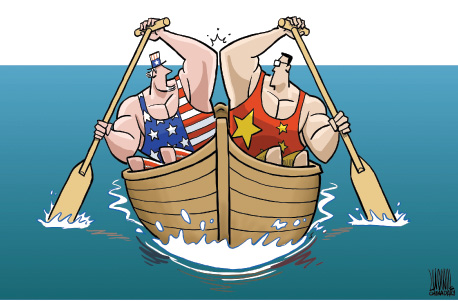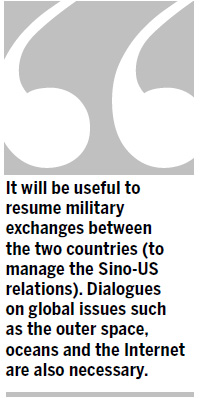View
Improving Sino-US ties will test leaders's wisdom
By Zheng Wenzong (China Daily)
Updated: 2010-08-20 16:37
 |
Large Medium Small |

Despite China's repeated objections and warnings, the Pentagon said on Aug 5 that the aircraft carrier USS George Washington would participate in joint naval drills between the United States and the Republic of Korea in the Yellow Sea. The US has won the tussle against China on whether the US aircraft carrier should enter into the Yellow Sea for the war games.
It will not be the first time a US aircraft carrier enters the Yellow Sea. But the argument was surely the most heated. Thanks to media reports and strong official positions, the participation of the aircraft carrier in the war game is more about "face" than a deterrent to the Democratic People's Republic of Korea.
Under the context of the roller-coaster China-US ties, we have reasons to worry.
China-US relations have been worsening due to disputes over Taiwan, Tibet, Google, the yuan exchange rate, the Yellow Sea and South China Sea, despite a warm relationship last year when "a positive, cooperative and comprehensive" partnership was promised.
As threats of a new Cold War surface, many people are shocked by the changes that took place in just a matter of a few months.
China and the US have comprehensive common interests as well as deep-rooted conflicts. The ups and downs reflect such a complicated relationship.
However, compared with several crises and low points in bilateral ties after the Cold War, this new round of conflicts is so extensive and wide-ranging that it almost looks like the start of a long-term, all-out strategic competition.
I believe there are several reasons behind it.

First, the US has been increasingly more concerned about a challenge from another power, now that anti-terrorism is a lesser priority in its national security strategy. Sino-US cooperation is also losing support. And the global financial crisis has highlighted the rise of China and decline of the US. How to deal with a strong China has now become an urgent task.
Second, US President Barack Obama's soft China policy had evoked conservative criticisms. As the November mid-term elections approach and unemployment rate remains high, a tougher stance on China will win him political points.
Third, the US may feel a challenge to its dominant position as China takes strong moves to protect its interests, such as threatening sanctions against American companies over arms sale to Taiwan, opposition to the US carrier's presence in the Yellow Sea and America's part in South China Sea dispute.
We should know that misjudgments and mistakes might have also exacerbated tensions in bilateral relations.
China feels Obama may not mean what he says as he continues to sell arms to Taiwan and meet the Dalai Lama, after repeatedly welcoming the rise of a strong and prosperous China. The US feels China has mistakenly thought the US is in decline and has become overconfident.
On regional issues, while China considers its rights to defend the integrity of its seas, the US has regarded the position as restricting the freedom of navigation or flight, and that China is attempting to edge the US out of Asia.
On international issues, China considers itself a developing country with limited international influences. As such it cannot take too many obligations in global economy, climate changes and containment of Iran's nuclear ambitions. But the US thinks of China as a rising world power with responsibilities for world affairs.
How to manage the Sino-US relations and keep the ties under control will be a test to the wisdom of the leaders of the two nations. As far as the security relationship is concerned, the difficulties and military rivalry may involve other countries.
It will be useful to resume military exchanges between the two countries. Dialogues on global issues such as the outer space, oceans and the Internet are also necessary.
However, if the two sides do not change their zero-sum mentalities, such interactions will not be enough to eliminate their distrust for each other.
The author is a scholar at the Institute of American Studies under the China Institutes of Contemporary International Relations in Beijing.